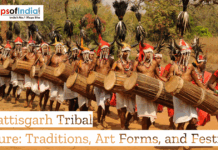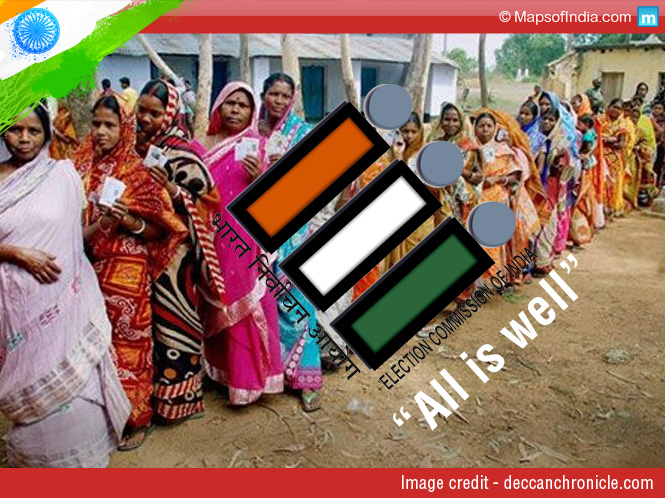The UPA II and the BJP contest in the 2014 elections – an analysis:
The 2014 elections, though apparently a normal electoral procedure, may have immense social and socio – political repercussions. The election is also significant in the global perspective of international politics. If we subtract the political parties and take a look at the individuals representing them, this election is going to be primarily a battle between Rahul Gandhi and Narendra Modi, much like a Presidential style election, marked by antagonism and dissention.
The opposition National Democratic Alliance (NDA) is also an alliance, dominated by the BJP that has become one of the most popular political parties of the country in the recent times. The principles of BJP are based on the Hindu ethnocentricity and orthodoxy. The popularity of BJP is evident from the tenure of the NDA and BJP – led Government from 1998 to 2004. Another radical coalition partner happens to be the Shivsena of Maharashtra, who can be best described as bordering on Hindu extremism. India is the country with the second largest Muslim population in the world. The zero tolerance of the BJP regarding compromise of Hinduvta issues and its attitude of persecuting non – Hindus were established as early as 1992 with the Babri Mashjid incident. BJP was the instrumental factor in the attack and the consequent demolition of the Babri Mashjid in Ayodyha, adding new dimensions to the Hindu – Muslim animosity.
Enter Narendra Modi. Modi joined BJP to promote his strong adherence to the Hindu nationalistic views with perceptible inclinations to the Shivsena…..a reason that further complicates the communal issues in Gujarat during his tenure as the Chief Minister of Gujarat. The communal riots of 2002 thatclaimed the lives of almost 800 Muslims and 300 Hindus, had raised many an accusing finger at Modi for fuelling the violence, despite his immediate attempts to contain it. A Supreme Court supervised inquiry in 2009 – 2010 had cleared Modi’s involvement in the riots declaring him not guilty. Though further investigations into the matter failed to impeach Modi as a perpetrator of the mass slaughter, the image of Modi had been somewhat tainted by the communal riots. However, Gujarat had prospered consistently under the leadership of Modi, which undoubtedly improved the tailwinds of Modi’s candidature as the future Prime Minister of India under the BJP banner in the light of the 2014 elections.
The new wind in the sails of the BJP Prime Ministerial candidate had been the lifting of the prohibitions by Britain and the European Union regarding Modi’s entry into the said countries. USA still poses a problem for Modi as he is till banned from entering the country. As of March 2013, Modi was granted a membership of the Parliamentary Board of the BJP and the recent victory of BJP in the assembly elections and the crushing defeat of the Congress further strengthens Modi’s position as the likely forerunner of the 2014 elections.
The present Congress – led UPA II Government is definitely in a fix. The present and the 13th Prime Minister of India, Dr Manmohan Singh, perhaps the only Prime Minister of our country doing a second term, the brilliant ‘economist’ and an Oxonian, who had liberalized India’s economy, is on the wrong side of eighty and hardly a match for Modi. Besides, the general feeling skeptic that Dr. Singh is actually a puppet, dancing to the tunes of Sonia Gandhi, the President of the Congress Party also disfavors another term in the current portfolio he is holding.
So enter Rahul Gandhi, in his early forties, politically the only probable contestant of Modi in the 2014 elections, who is worth a second look and the possible ace in the hole for the Congress Party. The Gandhi Dynasty had been instrumental in dictating the political scenario of our country since the independence and the Gandhi family is the de facto uncrowned Raj family of our country. Rahul Gandhi, other than being the Vice President of the Congress Party also heads the Indian Youth Congress and the National Students Union. He is the youthful face of the 127 year old Congress Party, which has already earned the infamy of being a political party, weak at the joints ruled by old school leaders with anachronistic principles. Now, there are two vital questions… Does Rahul Gandhi have the natural acumen of being a worthy descendant of his legendary political ancestors? And does he have enough charisma to influence the youth of our country? It needs to be mentioned here that. Modi has a countrywide following of Cyber Hindus, comprising of young urban yuppies that form an integral part of Modi’s tech – savvy electoral campaigns.
Also while Modi has shown significant achievements as the Chief Minister of Gujarat, Rahul Gandhi has done very little to add arrows to his political quiver. Modi will secure a solid support from the die – hard Hindu centrioles and the business community in general, while the Congress is counting on the young, metrpolitanized and the advanced vote banks not to mention a few Muslim votes as well. As for the Dalits and the minorities other than the Muslims and the tribals, it is very difficult to predict in whose favor the scales will be tipped. Muslims will predictably polarize into strong anti – BJP factions and, while both Rahul Gandhi and Narendra Modi would want to avoid volatile communal issues in the 2014 elections for their own different set of reasons, it is inevitable that the upcoming elections will be strongly divided along the communal lines.
Taking into account the international politics involving countries like Bangladesh, Pakistan and Afghanistan, the discontented Muslim factions and the terrorism issues, Congress is definitely ahead of the BJP in such matters, adopting a ‘no nonsense’ attitude as far as the national security is concerned. The UPA is already better placed than the BJP in the light of the international relationships; but Rahul Gandhi fails to feature in the global scenario. Modi can at least claim successful FDI securing for the state of Gujarat by collaborating with China and other similar countries. If Modi emerges as the Prime Minister of India, then USA will have to rethink about its prohibition of not letting Modi entering the country.
Finance Minister P Chidambaram’s perspective of the upcoming elections:
Highlighting his opinion that, the future Government emerging victorious from the 2014 elections may not be comprised of a solid majority, as of 14th December 2013, Finance Minister P Chidambaram commented, “I think let’s wait for the elections. I am not sure that the elections will throw up a government with a solid majority in the Parliament.” He added that in the event of such an outcome, it will be marked as a turning point in the political history of our country and will be an instrumental factor in wiping out the present drawbacks of our country. He dubbed the current situation as extremely uncertain and unfavorable for the democracy of India and further added that, “The executive has been hindered or hampered by overreach of our institutions. Parliament is nearly totally paralyzed and there is mistaken, romantic view that there is a judicial solution to our problems. I think in terms of the three branches of the Government coming together, which is a necessary precondition – we are in one of the weakest points in India’s history. We have to overcome this”.
Conclusion:
So to conclude the 2014 elections are of a vital importance because, the wagers in this contest are of enormous significance, namely the economic development of India – the same factor that has elevated the country in the global perspective, the inflation issues that have already spread into the food market, the demographic issues and the primeval poverty and illiteracy issues. Apart from the domestic factors, the elections are also going to affect the stand of our country in strategic international issues.
Whether the emerging Government gets a solid majority in the Parliament or not, the 2014 elections will prove to be a much observed spectacle, both nationally and internationally. The Rahul – Modi contest will also prove to be an entertaining one, with one contestant belonging to the elitist Gandhi family with the right heritage and title, while the other had started his career as a tea – boy and had finally made his bones in the highest echelons of Indian politics.
Related Information:




